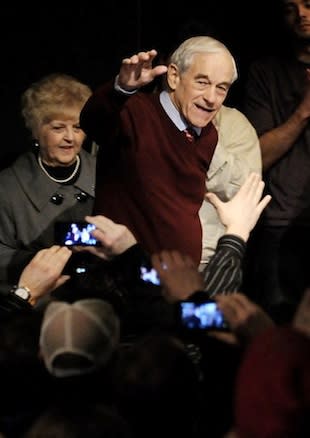 The Ticket
The TicketRon Paul soldiers on despite lack of first place wins

All candidates remaining in the 2012 Republican presidential race are touting their first place finish in at least one state as a testament to their voter support.
But, Texas Rep. Ron Paul has yet to win that distinction, despite heavy investment in caucus states.
Paul has been concentrating on caucus states, telling the public and the media that his grassroots efforts are more fruitful in these types of contests. But Paul's opportunities to prove that claim are diminishing with each passing caucus. He placed third in Nevada's caucuses on Feb. 4, a distant second in Minnesota's caucuses and fourth in Colorado's caucuses on Feb. 7. His best effort: a narrow second-place finish in Maine Saturday where Mitt Romney has been declared the winner despite one potentially Paul-heavy county vote remaining this coming Saturday.
When questions arose regarding Paul's electability in the face of these second, third and fourth place finishes, supporters and staffers respond by noting that Paul is still racking up delegates in many of these states due to the proportional allocation of delegates (one of Paul's major strategies). And they continue to look ahead as Paul and his team signal no signs of curtailing their efforts.
"Well, the next contests in this race are of course Arizona and Michigan," wrote Paul spokesman Gary Howard in an email to Yahoo News in response to questions about where Paul turns post-Maine. "But for us Washington state is where we've focused more resources--and after that some of the other caucus states coming up on Super Tuesday." Washington voters hold caucuses March 3 ahead of Super Tuesday on March 5.
Howard highlighted North Dakota and Idaho as states where the campaign already has staff on the ground, adding that Paul and Romney are the only candidates who made it onto the ballot in Virginia. All three of these states vote on Super Tuesday when a total of ten states go to the polls.
Howard said the campaign remains "confident that [Paul] will have the Maine delegation going into the Tampa convention."
Maine's caucuses were "non-binding," meaning they have no direct impact on the actual delegate selection process. In Saturday's "straw poll," Paul received 36 percent and Romney received 39 percent with 84 percent of precincts reporting.
Turnout was very low-- Romney received 2,190 votes to 1,996 for Paul (plus 989 for Rick Santorum and 349 votes for Gingrich). Washington County is set to vote this coming weekend but officials have told the press that turnout there has never topped 120 participants.
Maine has 24 delegates total, which the state will allocate proportionally.
Paul has focused on winning delegates as a way to continue influencing the 2012 race. Though he's racking up some top-tier finishes and demonstrating support across the country, many Republican strategists continue to view Paul as a marginal candidate who at this point wouldn't be greatly boosted by a first-place win anyway.
"I don't know anyone who believes Ron Paul's going to be the nominee— [anyone] on a professional level," Republican consultant Matt Mackowiak told Yahoo News. "He's having really a quite a marginal impact on the race right now. And I don't see anything likely to change that."
Mackowiak said Paul is likely to win first place in a small state at some point, but noted that as the number of states holding caucuses diminishes and we move into primary-only season, the chance of Paul achieving this significantly decreases.
More popular Yahoo! News stories:
• Supreme Court Justice Stephen Breyer robbed by machete-armed intruder while on vacation
• New Pew survey: Among Republicans, Santorum in statistical dead heat with Romney
• Obama sends 2013 budget to Congress, GOP pounces
Want more of our best political stories? Visit The Ticket or connect with us on Facebook, follow us on Twitter, or add us on Tumblr. Handy with a camera? Join our Election 2012 Flickr group to submit your photos of the campaign in action.
